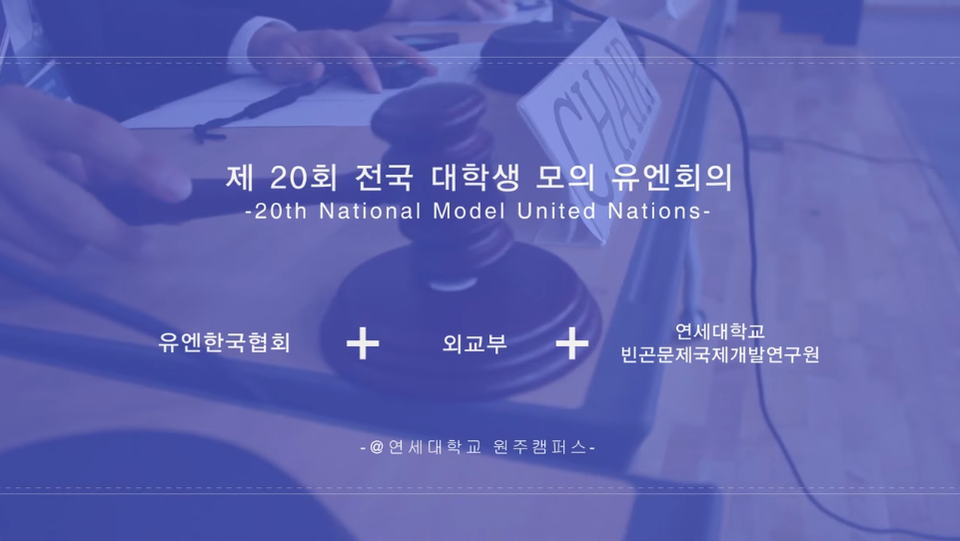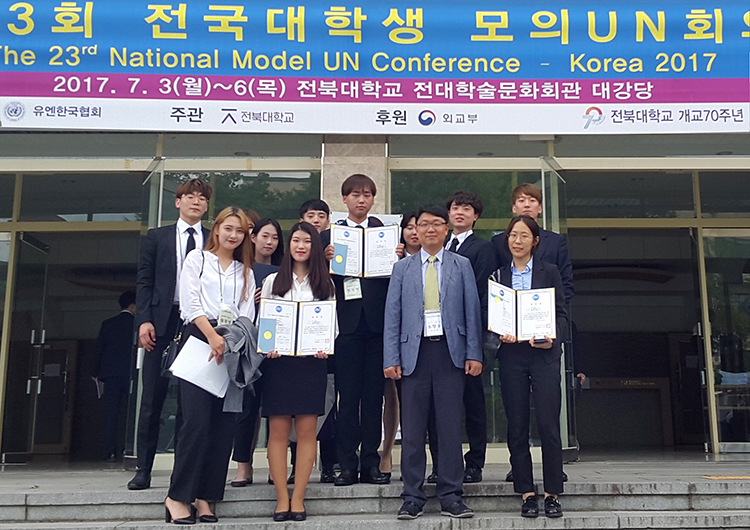If you are interested in global society and want to be dedicated to world peace, you may dream of working for the United Nations. And yet for many, this feels like it’s a rather far away dream, especially for university students. However, there are a few Dankookians (students of Dankook University) who have achieved amazing accomplishments by taking part in the 4th National Model UN (NMUN) Conference. They took home this year’s top prize.
 |
| ▲ National Model United Nations Conference is held by United Nations Association Republic of Korea. |
The NMUN Conference takes place annually in summer months offering college students an opportunity to improve their understanding of international relationships. Even though it is hypothetical conference, the diverse people at the conference have a chance to deal with a variety of agendas that are likely to appear before United Nations committees. Each contestant team represents a country and is challenged to settle issues according to the UN General Assembly rules of procedure. DKU Department of Political Science and International Relations has been supporting and promoting competitors and Dankookians from other majors are also welcome to take part. The Dankook Herald (DKH) interviewed the winning team, which consisted of three students from Dankook’s Department of Political Science and International Relations and one student from School of Communication who were led by Professor Cho Han-seung. Shin Joo-young (Senior, Dept. of Political Science and International Relations) told us more about this conference and why it is an exceptional experience for undergraduates. Shin and her teammate Won Soo-yeong, represented the Chinese government in the Fourth Committee of the conference.
Q. What was your motivation to participate in National Model UN Conference?
A: I spent a year in Australia in 2016, through an international exchange program, so I had to visit my professor several times to address administration issues. One day, Professor Jo Han-seung recommended I participate in the NMUN Conference. I went through the introductions and it seemed like a great opportunity for me. That’s how I decided to be a contestant.Q. What was your motivation to participate in National Model UN Conference?
Q. What are some of the unforgettable moments?
A. I remember writing the script for a keynote speech with my teammate. We thought the keynote speech was critical, as it opened up our team’s opinion in the discussions for the first time. This means it would set the tone for our position throughout the whole conference. Therefore, we invested our very best efforts in preparing this speech. Additionally, my teammate is fluent in Chinese, so she could use very fresh and timely appropriate information written in Chinese for the speech. Furthermore, during the conference, every moment is unforgettable, but meeting with other participants, early in the morning was quite challenging. Throughout the conference, I had to do research for discussions of the next day until midnight and since the whole consultative group was focused on making a proper resolution, we were always in rush. That’s why our committee met in early morning and those meetings were the most unforgettable moments during the entire process of the conference.
Q. Other than early morning meetings, what other difficulties did you have to face while competing?
A. Since all contestants represent a country, there were always conflicts and arguments. In the resolution establishing sessions, everyone wanted to reflect their own interests. Sometimes the arguments would go almost all day, which clearly made us exhausted. All teams knew that we had to reach a conclusion and a compromise at the end, but nobody wanted to back off their position, so finding a compromise between two, or sometimes even more arguments, lasted for hours. Other than ensuring each team’s interests, all subjects of the meeting were basically evaluated and tension arose when it came time to make judgements. Everyone was eager to speak out and the high tension made it very difficult for me. I had to develop my skills to face confrontation.
 |
| ▲ The DKU team for National Model UN Conference. Won Soo-hyun in the middle teamed up with Shin Joo-young and won a prize. |
Q. In your opinion, what made you win the prize?
A. First, the judges in charge of our committee started evaluating us based on unofficial meetings and my team tried to be as active as possible in these unofficial meetings. I think that may have given the judges good impressions of us. Second, we tried very hard to keep our statements well-prepared and reasonable on almost all items. For instance, the agenda about climate change and role of the Green Climate Fund is such a huge topic and some teams were not prepared enough to put forward detailed arguments. Although we might have not been fully prepared about some issues, we did quick research spontaneously so we were better prepared in the follow up discussions, which provided us more opportunities to deliver a proper statement. Finally, our way of approaching the agenda was to represent the needs of developing countries. For example, supporting climate change initiatives in China seemed tricky, but at the same time, China exerts enormous power in international relationships. Therefore, our team emphasized the needs of developing countries. Thus, we were able to work as a leader of the developing world in the discussions which made us stand out.
Q. What are things you earned from this experience?
A. Even though it was a model conference, the way each contestant made deals with another team was almost as fierce as in the real UN conference. This experience reminded me of the importance of consultation and mutual agreement. Furthermore, it was a great opportunity to practice what I have learned from my political science curriculum. My political science classes provided me with the basic background I needed to approach the issues and also gave me an efficient tool to figure out how to build international relationships.
Q What other activities would you like to do next?
A. At the conference, a UN official came by and gave us a short presentation of how the UN works and how human resources are handled at the UN. This time, I participated in the competition, but next time I would like to work as a volunteer or an intern for the UN or another international organization if possible.
Q. Can you give some advice to Dankookians who want to participate in National Model UN Conference?
A. If you are a freshman or sophomore, I recommend trying it out as an observer first. You only have one chance to be a contestant, so being an observer of the conference first will help you understand how the process works and the importance of developing a wide range of skills for the conference. This will be a great help for when you actually become a contestant later. Moreover, it is very important to write an outline and rough sketch of your strategy, so you can earn points and take initiative in the committee. We focused on identifying replaceable and irreplaceable perspectives in the agenda. Knowing what you can give and take and knowing how other subjects are going to react to your suggestions should be your best approach. Such a strategy added to our profound understanding of diplomatic relationships and will give you a proper idea of how to move around the meeting room. Lastly, I insist that you try hard not to be afraid of taking part in such big contests. It is always good to take any opportunity to challenge yourself and the DKU model UN study group (DKMUN) is a great example of how you can do this.
Throughout the interview, the DKH learned how hard it was to devote oneself to this three month competition and to handle the constant tension between participants. At the same time, it is very clear that they all gained the ability to handle confrontations, produce quality research, build solid arguments, and make compromises. These are skills that are always desired, even in your daily routine and diverse working spaces. Therefore, the DKH highly encourages you to participate in big events such as these, and build your own skills for a successful future.
박채리, 심형석 dankookherald@gmail.com

![[Campus Magnifier] Let's Surf the Library!](/news/photo/202404/12496_1765_4143.jpg) [Campus Magnifier] Let's Surf the Library!
[Campus Magnifier] Let's Surf the Library!
![[Campus Magnifier] Let's Surf the Library!](/news/thumbnail/202404/12496_1765_4143_v150.jpg)





